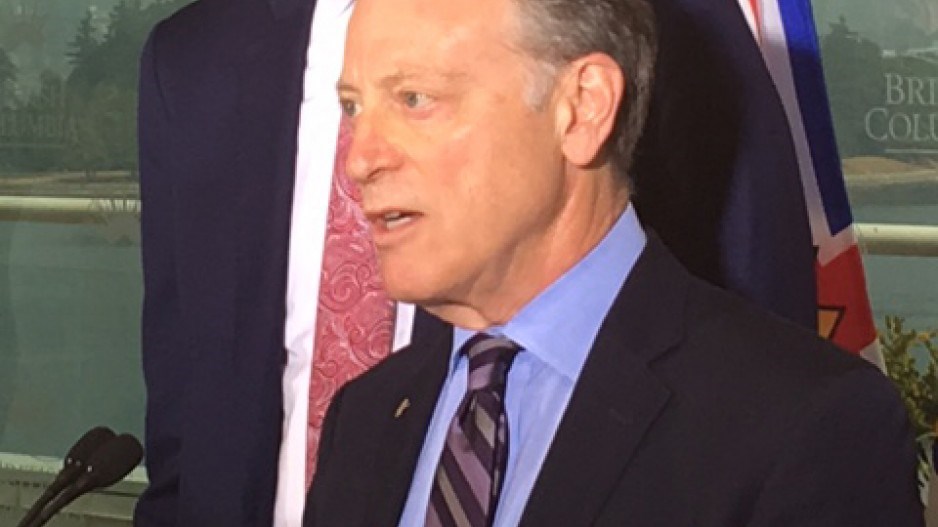The B.C. NDP government has hired Thomas Berger, a former BC Supreme Court judge who chaired the Royal Commission on the failed Mackenzie Valley pipeline project in the 1970s, to lead a legal battle against the $7.4 billion Trans Mountain pipeline expansion.
NDP Environment Minister George Heyman and Attorney General David Eby jointly announced Thursday Aug. 10 that the province will launch two legal strategies to halt the expansion, which has been granted both federal and provincial approval through the National Energy Board and the BC Environmental Assessment Office.
The government will seek intervener status in a legal challenge that will soon be heard by the federal court against the National Energy board's approval of the expansion.
It will also refuse to issue permits until all conditions with respect to consulting First Nations have been met, as per the provincial Environmental Assessment Office. Not all conditions have been met, Heyman said.
"There are a number of permits issued, but they cannot be acted on until the company meets the requirements of the environmental assessment certificate that was issued by the previous government of British Columbia," Heyman said.
"Before they can begin work, the certificate required them to complete environmental management plans. There are eight of them. Only three have been accepted to date and the other five have been not accepted because they have not, according to the environmental assessment office, met the test of adequate consultation with First Nations.
"So until those plans are completed, Kinder Morgan – with the exception of private land and with the exception of some clearing or right-of-way – cannot put shovels in the ground."
He said it was "highly unlikely" that can be done by September 12.
"Until it is completed, they are not able to begin work. They will be in violation of their environmental certificate."
Kinder Morgan Canada plans to start work multiple stages of the project in September.
There are currently two legal challenges that will soon come before the courts. In a federal court application for a judicial review of the NEB's approval of the pipeline expansion, the province will seek intervener status.
The other challenge is by the Squamish First Nation, which has filed a lawsuit against the province in B.C. Supreme Court for issuing an environmental certificate for the pipeline expansion. The province is the respondent in that case. And the court may now see the unusual spectacle of the party being sued basically pleading "guilty as charged," rather than defending itself.
Not all First Nations in B.C. are opposed to the project. Many have signed benefits agreements with Kinder Morgan. Heyman said they too will be part of the additional consultation that the NDP government will now require.
Provided the federal court grants the government intervener status, the government plans to argue that consultations with First Nations have not been adequate. The NDP also wants the United Nations Declaration on the Rights of Indigenous Peoples (UNDRIP) to guide those consultations.
Robin Junger, an aboriginal law expert with McMillan LLP, says the courts, not the government of the day, decides what is adequate consultation.
“The duty to consult aboriginal groups is based on a specific test established by the Supreme Court of Canada in Haida Nation v. BC (Minister of Forests)," Junger said in an email to Business in Vancouver. "It does not change based on a change of government, a government’s approach to Indigenous relations or a government’s view of any particular project.
“The UNDRIP is not part of that test. The courts have been clear it is not part of the law of Canada, so if any government in Canada were to apply it instead of the test for consultation set out in the Haida case, I believe that would raise significant legal issues. I think the courts would look unfavorably on any government using the duty to consult as a foil, particularly if significant third party rights are involved.”
Responding to today's announcement, Kinder Morgan Canada said it is taking the NDP government's threats seriously and will be carefully reviewing them.
But Kinder Morgan Canada president Ian Anderson said the company plans to move forward, as planned, with its construction work in September.
“We are committed to working with the province and permitting authorities in our ongoing process of seeking and obtaining necessary permits and permissions,” Anderson said in a brief written statement.
“We have undertaken thorough, extensive and meaningful consultations with aboriginal peoples, communities and individuals and remain dedicated to those efforts and relationships as we move forward with construction activities in September."
Werner Antweiler, associate professor at the University of BC’s Sauder School of Business, doesn’t think the B.C. government has a very strong case because, ultimately, interprovincial pipelines are a federal jurisdiction.
“Remember, they said they would use every tool in the toolbox to fight this, and what’s left in the toolbox?" Antweiler said. "There’s no power drill and no jackhammer. There’s only a little screwdriver in there.”
The fight against the pipeline could be an expensive one, and not just because of the legal costs.
One of the five conditions that the previous Liberal government set for supporting the pipeline was getting more revenue out of Kinder Morgan. The company agreed to what some have characterized as extortion money.
The company agreed to paying the provincial government $1 billion over 20 years – $25 million to $50 million per year, depending on the pipeline’s annual revenue.
But now that the NDP government is not only not supporting the project but actively trying to kill it, could that revenue sharing agreement be considered null by Kinder Morgan?
“I would be surprised if there wasn’t a clause that allows either side to claim that conditions haven’t been met and therefore this contract is null and void, if the province is reneging on the commitment they made to actually facilitate this project," Antweiler said.
Kinder Morgan Canada's shares were down 3.5% this morning.




